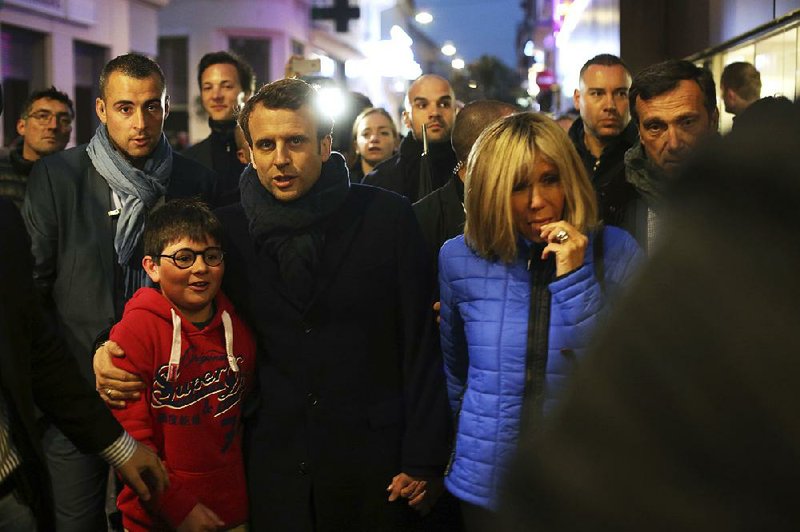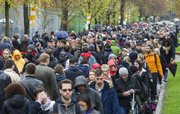PARIS -- France's election campaign commission said Saturday that "a significant amount of data" -- and some fake information -- has been leaked on social networks after a hacking attack on centrist Emmanuel Macron's presidential campaign.
RELATED ARTICLE
http://www.arkansas…">In a French twist, wife the December
It urged citizens not to relay the data on social media to protect the integrity of the French vote.
France's government cybersecurity agency will investigate the attack, according to a government official who said it appeared to be a "very serious" breach.
The leak came 36 hours before the nation votes today in a crucial presidential runoff between Macron and far-right candidate Marine Le Pen -- and just as a two-day blackout on campaigning began so that voters could reflect on their choice.
"Intervening in the final hour of the official campaign, this operation is clearly a matter of democratic destabilization, as was seen in the United States during the last presidential campaign," Macron's campaign said in a statement late Friday, minutes before the communications prohibition went into effect.
The leaked documents appear largely mundane, and the perpetrators remain unknown.
The election commission met Saturday after the leaks emerged just before midnight Friday. The commission said the leaked data apparently came from Macron's "information systems and mail accounts from some of his campaign managers." It said the leaked data had been "fraudulently" obtained and that fake news was probably mingled in with it.
The commission urged French media outlets and citizens not to relay the leaked documents. In addition to the blackout on rallies and campaigning, French electoral laws imposed a news blackout Saturday and most of today on any interviews, election polls or other media coverage in France seen as swaying the election.
The Macron team asked the campaign oversight commission Saturday to bring in France's National Cybersecurity Agency to study the hack, according to a government official who spoke to The Associated Press on condition of anonymity because he wasn't authorized to discuss the details publicly.
The agency can be called in only for cases where the cyberattack is "massive and sophisticated" -- and the Macron hack appears to fit the bill, the official said.
Macron's team confirmed that it had been hit by a "massive and coordinated" hack some weeks ago, in which unidentified hackers accessed staff members' personal and professional emails and leaked campaign-finance material and contracts -- as well as fake documents -- online.
Within hours after the hacked documents were made public, the hashtag #MacronLeaks began trending worldwide.
Le Pen's campaign could not formally respond because of the campaigning blackout, but Florian Philippot, an official with her National Front party, asked in a tweet: "Will the #Macronleaks teach us something that investigative journalism deliberately buried? Frightening democratic shipwreck."
In a cursory look at the leaked documents, they appear to be day-to-day communications. Other documents, which seem to date back several years, don't appear related to the campaign at all.
From depressed northern France to the streets of Paris, few voters seemed aware Saturday of the hacking attack on Macron's team -- although several were looking forward to the end of a vitriolic campaign. News of the hacking complaint was picked up by print media including the newspaper Le Monde and the news agency Agence France-Presse and debated on social media, though broadcasters remained silent on the matter Saturday.
Those who had heard of the hacking said the non-incriminating leaks and subsequent social media campaign -- largely in English -- represented a last-minute attempt to undermine Macron.
"It's so obvious, and you make all the connections so easily," said Nicolas Vanderbiest, an expert on social media networking who blogs about its influence. "It's very amateur."
Most voters interviewed on the streets of the French capital Saturday shrugged off the hack. Paul Lotere, a 29-year-old civil servant, said he was angry because the timing of the documents' release gave Macron's campaign little chance to respond. He plans to vote for Macron, and he said he had no interest in the documents until their veracity was confirmed.
Alain Chappotteau, a 51-year-old psychologist, mocked the Twitter tag line used to share the news.
"Ah, yes, 'hashtag Macron leaks,'" Chappotteau said. "With all the fuss, all the tricks, in this campaign, what's one more? I'm voting for my child's future. This doesn't matter."
russia's hand
By Saturday, a trail of digital crumbs appeared to tie the attack on Macron's campaign to Russian hackers. Forensics specialists found that one of the leaked Excel documents from Macron's campaign had been modified on a Russian version of Excel and edited on Russian-language computers.
Matt Suiche of cybersecurity firm Comae Technologies said "there's Cyrillic script in the metadata."
One document had last been modified by a Russian user named Roshka Georgiy Petrovich. Petrovich, 32, an employee of Eureka, a Moscow-based technology company, did not immediately return emails requesting comment. Eureka's clients include several Russian government agencies.
U.S. intelligence officials say Russian government agencies regularly outsource political cyberattacks to Russian cybercriminals and top computer engineers. Security experts note that the digital crumbs could be the sloppy work of a Russian engineer, or left as a false flag by hackers looking to mask their true identities and whereabouts.
Russian involvement has been an issue in the campaign. For months, Russian state media outlets have given Le Pen positive coverage while accusing Macron of being secretly gay and of embezzling public funds. Macron has said that his campaign has been the target of Russian meddling, though Russia has denied those accusations.
Although the hacking attack was connected to Russia, the Twitter promotion of the documents was connected to the United States. Ben Nimmo, a research fellow with the Washington-based Atlantic Council's Digital Forensic Research Lab, said the first person to use the #MacronLeaks hashtag and link to the hacked documents was Jack Posobiec, a Washington-based correspondent for the alt-right website TheRebel.media. The documents were then shared more widely by the international group WikiLeaks.
Many of the Twitter posts about the hacking have originated in the United States, according to Trendsmap, a data analytics tool. About half the social media messages around political hashtags linked to the breach have been written in English, based on a review of Trendsmap data. Analysts note that the two most popular hashtags about the hack -- #MacronLeaks and #MacronGate -- are both English.
"It doesn't seem at this stage that there are lots of high-profile, non-Le Pen accounts jumping in and spreading the message around," Nimmo said. "They have kept their constituency -- and they have galvanized their constituency -- but they haven't necessarily stepped outside of that constituency."
overseas voting
Voting started Saturday in France's overseas territories and in some embassies abroad.
The first French territory to vote Saturday was Saint-Pierre-et-Miquelon, an archipelago near Newfoundland, where voters arrived dressed in scarves and jackets to ward off the chilly weather. Shortly afterward, voting started in French Guiana and the French West Indies, where voters wore shorts.
French citizens also turned out in droves to vote in the Canadian province of Quebec. The French consul general in Montreal said more than 57,000 people had registered to vote in the province, the vast majority in Montreal.
The last polling stations on the French mainland close at 8 p.m. today, or 1 p.m. Central time in the U.S., when the first pollsters' projections and official partial results are expected.
The campaign has been unusually bitter, with voters hurling eggs and flour, protesters clashing with police and the candidates insulting each other on national television.
Le Pen has brought her far-right National Front party, once a pariah for its racial prejudice and anti-Semitism, closer than ever to the French presidency, softening its message and seizing on working-class voters' growing frustration with globalization and immigration.
Macron, a former economy minister and investment banker who has never held elected office, also helped upend France's traditional political structure with his wild-card campaign.
The candidates knocked out both the Socialist Party and the center-right Republicans in the April 23 first round of voting -- defeating establishment parties that had governed France since Charles de Gaulle ushered in the Fifth Republic in 1958. Voters now will choose between Macron's business-friendly vision and Le Pen's protectionist, closed-borders view. Macron wants a strong European Union, while Le Pen favors a France-first policy that could restore the franc and even follow Great Britain out of the bloc.
"There is sort of electoral neurosis," said Dominique Reynie, a politics professor at the Sciences Po institute in Paris. "Many of those who go to vote in the final round will find themselves forced to back someone who they normally wouldn't support."
Information for this article was contributed by Philippe Sotto, John Leicester, Raphael Satter and Angela Charlton of The Associated Press; by James McAuley and Isaac Stanley-Becker of The Washington Post; by Mark Scott, Benoit Morenne and Nicole Perlroth of The New York Times; and by Mark Deen, John Follain, Helene Fouquet and Gregory Viscusi of Bloomberg News.
A Section on 05/07/2017


